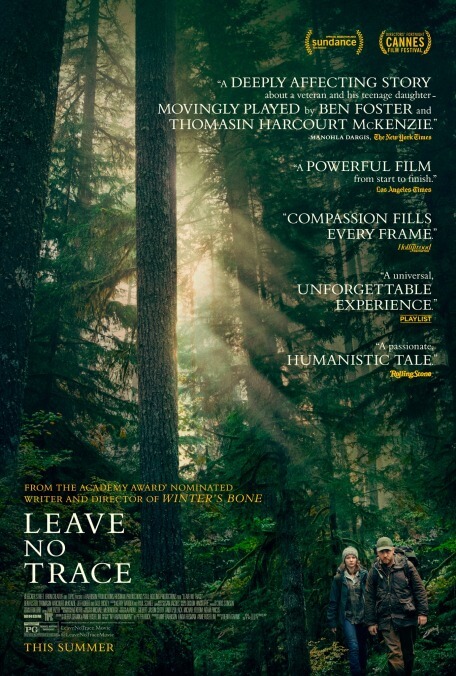Deep within Forest Park, an eight-mile stretch of woodland reserve in northwest Portland, Will (Ben Foster) squats with his 13-year-old daughter, Tom (newcomer Thomasin McKenzie). The two have carved out a makeshift encampment on the outskirts of civilization. By day, they forage for supplies, cook mushrooms using a handmade solar stove, and cover their tracks to avoid detection by the park rangers. By night, they share a tent, but nothing unseemly happens inside it—they’re simply conserving space and preserving warmth. Things are not always easy for Will and Tom, who enjoy few of the creature comforts many families take for granted, to say nothing of the constant vigilance on which their illegal outdoor residency depends. But there’s also contentment, a freedom and certainly a peace, in solitude. They have each other, and that seems enough for both of them.
But will it always be? If the opening minutes of Debra Granik’s Leave No Trace vividly, efficiently sketch a whole alternative way of life, the rest of this spare, understated drama shows what happens when that way of life is threatened—not just by the authorities who discover Will and Tom’s camp and drag them back into a world of rules and boundaries and structure, but also by the sudden potential for something more than what these two have made for themselves. Returning to narrative filmmaking some eight years after Winter’s Bone, Granik has made a film about the separate magnetic pulls of isolation and community. She’s also told, with a minimum of melodramatic bullshit, the tale of a father, a daughter, and the limits of the sacrifices they’ll make for each other. It’s a true story in which just about every element feels true: the relationships, the behavior, the crystal-clear vision of life on the cultural fringe of the Pacific Northwest.
Leave No Trace possesses little of the urgency and flavorful backwoods vernacular of Winter’s Bone, which scored a few Oscar nominations and launched the career of a young Jennifer Lawrence. Operating within a much less dangerous, volatile milieu, Granik strips away the crime-fiction affectation of that crackerjack Ozarks noir in favor of a realism more in line with her last movie, the nonfiction Stray Dog. And yet the strong, empathetic grasp on environment remains. Adapted from a novel by Peter Rock, itself based on a real incident clipped from the headlines, Leave No Trace exhibits an almost documentary curiosity about how people live, talk, and interact in this corner of the American landscape. It often seems content, in fact, merely observing routines: not just Will and Tom’s hand-to-mouth lifestyle, but also the behavior of the various folks they encounter once being forced out of their wilderness idyll. Which is not to say there’s no conflict. It’s there, simmering constantly underneath the codependent bond at the film’s center.
Forcefully removed from the public park they’ve long called home, Will and Tom are relocated to a farm outside the city—free room and board that comes with the stipulation that they interact with the locals, that they try to adapt. That may be easier said than done for Will, who’s gradually revealed to be a military veteran haunted by what he experienced overseas. (When the two needed money, he would sell his ineffectual PTSD medication to fellow homeless vets.) Foster, who tends to gravitate toward intense and off-kilter characters, plays Will as perpetually absent and restless, always antsy to put space between himself and the rest of the world. One wonders, at times, if it’s too distant a performance: However accurately Foster has captured the emotional remove of someone rocked by trauma, his Will remains a ghost, difficult to connect to in any meaningful way. But perhaps there’s enough expressive life for both of them in his costar’s turn. McKenzie, who’s worked largely in television, is terrifically naturalistic in a role that asks her to slowly awaken to the unknown pleasures and comfort of life among others—to show flickers of joy that maybe weren’t there when her world was smaller and simpler.
Perhaps there’s a universal story here, one about the ways children drift away from their parents, no matter how close they are to them. The film understands, too, how society can be a double-edged sword: The hospitality that Will and Tom enjoy at the farm comes with debt and responsibility—the social contract that the two opted out of for so long, when they existed, blissfully and self-sufficiently, in nature. And yet Granik never stacks the deck in favor of a life off the grid, à la that cutesy sitcom sensation Captain Fantastic. Conversely, by depicting as caring people everyone from the social workers who handle the pair’s case to the strangers who put them up, she makes a plenty strong case, too, for investing in community. Moving, perhaps inevitably, toward a final fork in the woods, Leave No Trace condenses big questions into something simple and quietly powerful: two people bonded by blood and shared history, discovering how their needs align and diverge.


 Keep scrolling for more great stories from A.V. Club.
Keep scrolling for more great stories from A.V. Club.